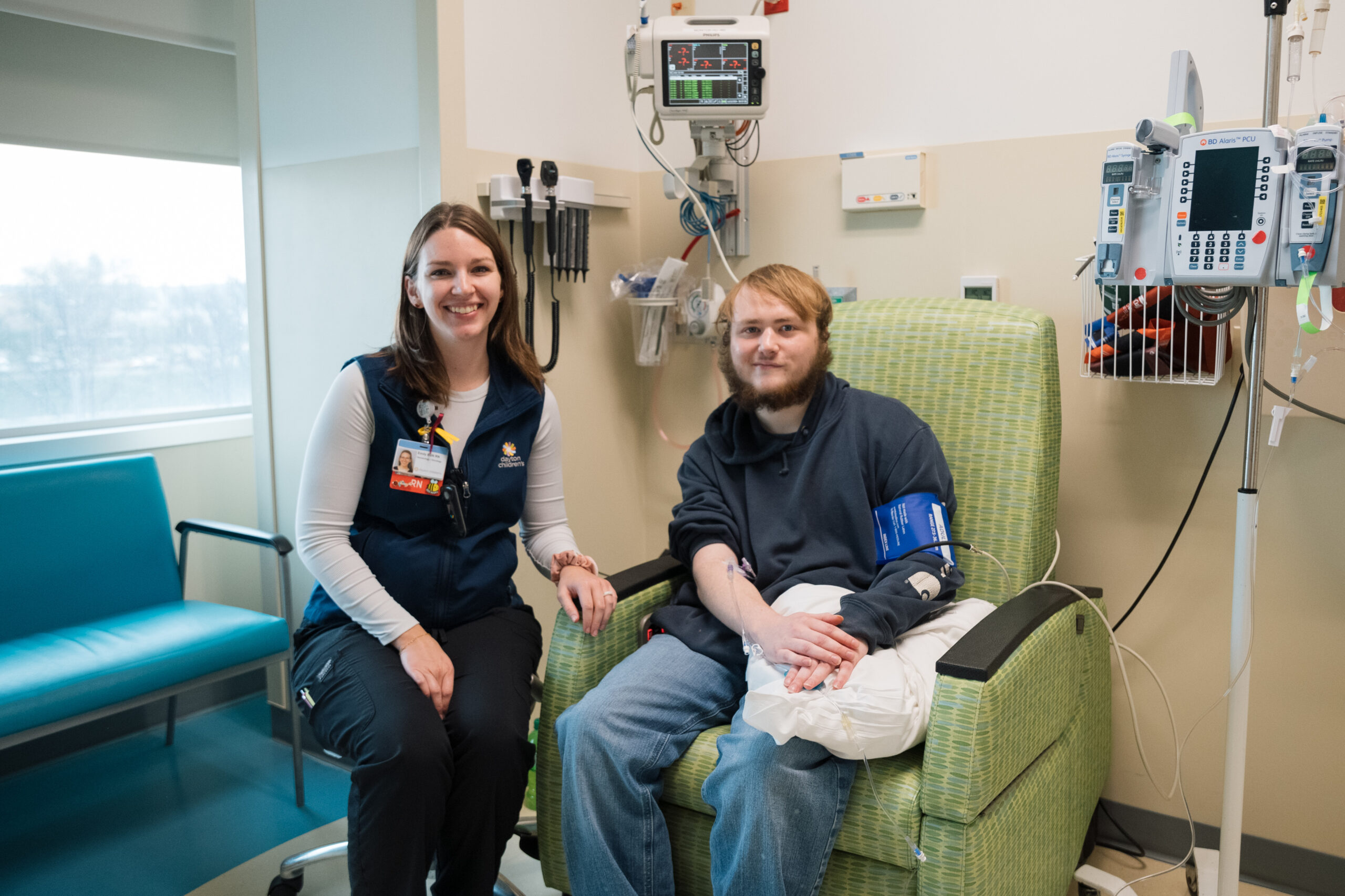pediatric gastroenterology


what is pediatric gastroenterology?
Gastroenterology is the branch of medicine that focuses on the digestive system, including the stomach, intestines, liver, pancreas and more. Pediatric gastroenterology is a subspecialty dedicated to diagnosing and treating these conditions in infants, children and teens.
A pediatric gastroenterologist understands how GI issues can impact a child’s nutrition, immune system, growth and energy levels. Symptoms like belly pain or irregular bowel movements might seem minor, but can sometimes point to underlying conditions that need attention.
why choose pediatric gastroenterology at Dayton Children’s?
We understand that GI symptoms can affect every part of a child’s daily life, including school, sleep, meals and even social confidence. That’s why our care goes beyond symptom management.
Why families choose us:
- Pediatric gastroenterologists with training in both common and complex GI conditions
- Multidisciplinary care teams including nurse practitioners, mental health specialists and dietitians. Minimally invasive diagnostics using child-appropriate technology
- Care plans that evolve with your child’s age, growth and goals
- Involvement in ImproveCareNow network, a national group of clinicians, researchers, patients and families working together to improve the health and care of children with Crohn’s disease and ulcerative colitis
We also provide access to advanced procedures, second opinions and continuity of care for chronic illnesses like IBD or celiac disease.


when to see a pediatric gastroenterologist
Many families aren’t sure when to seek care from a pediatric gastroenterologist. Here are some signs it may be time to schedule an appointment:
- Persistent stomach pain or cramping
- Reflux that doesn’t improve with basic treatment
- Feeding or swallowing difficulties
- Weight loss or poor growth
- Diarrhea or constipation lasting more than two weeks
- Blood in stool or frequent vomiting
- Ongoing fatigue or irritability linked to digestion
our gastroenterology specialists
Our gastroenterology team includes board-certified pediatric gastroenterologists, nurse practitioners, dietitians, mental health providers and care coordinators. Together, we work closely with families, primary care providers and other pediatric specialists to tailor treatment.
gastrointestinal conditions we treat
Dayton Children’s treats a wide range of pediatric gastroenterology conditions, including:
- Anorectal malformations
- Appendicitis
- Atresia
- Biliary atresia
- Celiac disease
- Choledochal cysts
- Cholelithiasis and gallbladder dysfunction
- Chronic abdominal pain or bloating
- Chronic diarrhea
- Congenital gastrointestinal issues
- Crohn’s disease
- Diaphragmatic hernia
- Duodenal atresia
- Encopresis
- Enteric duplication
- Esoinophilic esophagitis (EoE)
- Esophageal atresia
- Failure to thrive
- Feeding and swallowing disorders
- Feeding tube placement
- Fetal conditions
- Food allergies
- Food intolerance
- Gastroesophageal reflux (GER)
- Gastrointestinal (GI) bleeding
- Gastroschisis
- Hepatitis
- Hernias
- Hirschsprung disease
- Imperforate anus
- Inflammatory bowel disease (IBD)
- Intestinal malrotation
- Intestinal obstruction
- Intestine obstruction (small or large)
- Intra-abdominal cyst
- Intussusception
- Irritable bowel syndrome (IBS)
- Liver tumors and masses
- Metabolic and genetic conditions affecting gastrointestinal and liver function
- Midgut volvulus
- Motility disorders
- Necrotizing enterocolitis (NEC)
- Omphalocele
- Pancreatic diseases and disorders
- Peptic ulcer disease
- Polyps and polyposis syndromes
- Prune belly syndrome
- Pyloric stenosis
- Rectal bleeding
- Severe constipation
- Short bowel syndrome
- Thracheaoesophaegeal fistula (TEF)
- Tracheal-esophageal fistula
- Tracheoesophageal fistula (TEF/EA)
- Trouble swallowing or feeding difficulties
- Ulcerative colitis
- Vomiting
gastroenterology programs and clinics
Dayton Children’s offers several gastroenterology programs for patients who need specialized care. Our goal is to support long-term health and chronic condition management:
- IBD Center: Long-term management and personalized support for children with Crohn’s disease or ulcerative colitis
- Bowel Management Program: A multidisciplinary clinic to help children with severe constipation, incontinence or related issues
- Nutrition and Feeding Support: Diet-based treatment for underweight children, food intolerance and selective eating
- GI Imaging and Motility Testing: Functional diagnostics to better understand GI movement and structure
- Integrated Behavioral Health: Support for children whose GI symptoms are linked to stress, anxiety or sensory sensitivities
additional information & gastro programs
About 1 in every 100 people in the United States has celiac disease, an intolerance to gluten, the main protein found in wheat. When someone with celiac disease eats food that contains gluten, it creates a toxic reaction that causes damage to the small intestine and doesn’t allow food to be properly absorbed.
If your child is diagnosed with celiac disease, they will be paired with a physician and a dietitian specialized in treating children with this disorder. The dietitian will work with both the parent and the child on implementing a new gluten-free lifestyle.
Dayton Children’s congenital gastrointestinal surgery program combines the expertise of pediatric surgery and the division of gastroenterology and nutrition to provide a seamless continuum of care for babies born with complex gastrointestinal issues.
Inflammatory bowel disease refers to chronic diseases that cause inflammation of the intestines: ulcerative colitis and Crohn’s disease. It is not the same as irritable bowel syndrome (IBS). Our specialists will use a variety of tests to make an IBD diagnosis. If your child is diagnosed with IBD, our physicians will partner with you to develop a treatment plan to help relieve symptoms.
Sometimes, children need to be admitted to the hospital for serious gastrointestinal problems such as complications of Crohn’s disease, dehydration, growth failure or severe abdominal pain.
We know that a hospital stay can be stressful for children and their families. Our team places a high priority on communication to ensure that families know what to expect, understand the treatment plan and receive answers to all their questions. We do all we can to make patients and their families feel as comfortable and relaxed as possible during a hospital stay. We also know that you and your family value the relationship with your gastroenterologist that you see in the clinic. The gastroenterologist on call and other members of the inpatient team will work closely with your child’s outpatient provider to ensure the best care for your child.
After patients return home, our team continues to provide support and care. The gastroenterology department’s triage nurses are available by phone during normal business hours to answer questions, process pharmacy refills, discuss insurance coverage, explain test results and much more. After hours, the gastroenterologist on call is available to answer urgent questions.
The aerodigestive clinic at Dayton Children’s is designed for chronically ill children with disorders of the upper airway, lungs and upper digestive tract, including sleep and feeding problems.
Patients come to our clinic to meet with multiple pediatric specialists, including a pulmonologist, ENT specialist and a gastroenterologist. By evaluating your child’s condition together, the physicians can develop an understanding of their overall health and what kind of therapy is needed. This coordination of care is essential to your child’s wellbeing, since children who come to the center often have complex needs.
gastroenterology news and blogs
Get helpful tips and updates about gastroenterology. Whether you’re navigating a new diagnosis, looking for ways to manage symptoms or preparing for a procedure, our articles are here to support you.
patient stories
It is stressful to be diagnosed with a new condition. Hearing from other families and having a trusted care team with you for the journey can make a big difference. Our patient stories highlight real experiences from parents and kids who’ve faced GI challenges. See how they navigated care, found answers and got back to feeling like themselves again, in part thanks to our compassionate care team.
for your visit
Some children come to Dayton Children’s with a short-term gastrointestinal problem and need only one or two clinic visits to feel better. But many have a chronic condition that will affect them for months, years or even their entire lives. Whatever the case, our team is here to help with expert treatment and a compassionate approach. We provide long-term follow-up care for patients as needed, and can help them transition to an adult care provider when the time comes.
Treatment for gastrointestinal conditions varies. It can involve making dietary changes, taking medication, getting infusions, utilizing a feeding tube or undergoing surgery. For patients who receive nutritional therapy by mouth, feeding tube or IV, we offer a comprehensive nutrition support service. Our experienced staff provides close supervision of these therapies.
visiting our clinic
A typical visit to the gastroenterology clinic involves discussing your child’s symptoms and medical history, a physical exam, a conversation about any test results and medication needs, and time to answer questions and address any specific concerns. Depending on their symptoms and diagnosis, some patients may be seen by a pediatric gastroenterologist or by a certified nurse practitioner who is specially trained to care for patients with common gastrointestinal conditions.
Your child’s provider can make a referral to the gastroenterology clinic, and we strive to see patients as soon as possible after receiving the referral. Please send relevant medical records, including growth charts and results of prior evaluations, to us with the referral so that we can provide the best care and avoid repeating studies. If your child’s provider sees an urgent need, the gastroenterology office can schedule next-day clinic appointments.
what should I bring to my child’s first appointment?
For your first visit to one of our outpatient clinics, we ask that you bring:
- A list of your child’s medication(s), dose and strength
- A CD of recent X-ray images, if not done at Dayton Children’s
how long will my appointment take?
Please arrive about 20 minutes early to complete registration forms. The amount of time of your actual appointment will vary depending on the information needed, the exam and the testing needed.
This appointment is for a consultation only. Different care team members will get to know your child and how they’re feeling. We will do a physical exam, and your child will likely have labs drawn after the appointment. We will not do any procedures. Other tests may need to be scheduled at a later date. Please prepare for about an hour with us for your first visit. It could be shorter or longer, depending on your child’s specific care needs.
what will happen during my appointment?
After registration, one of our medical assistants or nurses will check your child’s height, weight and vital signs. They will also ask questions about how your child is doing. Once this is completed, your child’s physician or nurse practitioner will meet with you and your child to develop a plan of care.
Your child may need to have the following tests at their first appointment:
- Lab work (blood tests, stool tests, stool specimens)
- X-rays
Your child may need further testing by endoscopy or another procedure. If that is the case, our team of procedure nurses will help with scheduling, going over the procedure, reviewing the preparation instructions, and helping the physicians during the procedure itself.
extra support when you need it
When patients are diagnosed with illnesses such as inflammatory bowel disease or celiac disease, our team provides one-on-one education to help them and their families learn about how to manage their condition at home. These educational sessions can be scheduled at your convenience.
In addition to the staff in our division, we also collaborate with our colleagues in pediatric surgery, pediatric ENT, allergy and immunology, psychology, radiology, pathology and more to provide the best care for your child.
The gastroenterology division includes specialized registered dietitians who focus on children with gastrointestinal, liver and nutritional disorders. They are available to meet with patients and families as needed to provide comprehensive nutrition assessments and recommendations. They have extensive experience in helping children with special needs to meet their growth and development potential.
Sometimes, children need to be admitted to the hospital for serious gastrointestinal problems such as complications of Crohn’s disease, dehydration, growth failure or severe abdominal pain. The staff at Dayton Children’s is highly trained to care for these patients. Learn about inpatient care.
gastroenterology resources
Whether your child is preparing for a colonoscopy, managing a chronic condition like IBD or just starting their GI journey, we’ve gathered helpful tools and information in one place.
condition-specific resources
- gikids.org
- “The Poo in You” video (from the North American Society for Pediatric Gastroenterology, Hepatology and Nutrition)
- Constipation in Kids | Poop withholding and what to do when kids won’t poop!
- Constipation in Kids | Poop Accidents
- Constipation in Kids | What your poo is telling you
Other organizations provide extensive educational materials for patients and families dealing with gastrointestinal issues. Our specialists encourage families to find support through the following websites and organizations.
- North American Society for Pediatric Gastroenterology, Hepatology and Nutrition (NASPGHAN)
- American Gastroenterological Association (AGA)
- American College of Gastroenterology
- American Society for Gastrointestinal Endoscopy
- American Association for the Study of Liver Diseases (AASLD)
- National Institute of Diabetes and Digestive and Kidney Diseases, part of the National Institutes of Health
- gikids.org
gastroenterology hours and locations
Gastroenterology appointments are offered at several convenient locations.
FAQs
If your child has symptoms like chronic belly pain, poor weight gain, feeding struggles, frequent reflux or irregular bowel movements, it’s time to schedule with a pediatric gastroenterologist.
Different care team members will get to know your child and how they’re feeling. We will do a physical exam, and your child will likely have labs drawn after the appointment. We will not do any procedures. Please prepare for about an hour with us. It could be shorter or longer, depending on your child’s specific care needs.
Yes. We offer tools to identify food intolerances using clinical history, elimination diets and diagnostic testing when appropriate.
Most procedures, such as endoscopy or colonoscopy, are non-surgical. We will give you instructions to prepare for these procedures. For surgeries, we coordinate care with pediatric surgery team.
It depends on your insurance. Some plans require a referral from your child’s primary care provider. Contact our billing team if you’re unsure. We can help!
connect with a pediatric gastroenterologist
If your child is dealing with digestive issues, whether it’s ongoing stomach pain, constipation, food intolerance or a more complex condition like IBD, our pediatric gastroenterology team is here to help. We will partner with your family from diagnosis to treatment with care that fits your child’s needs. Schedule an appointment online or call 937-641-4000.
